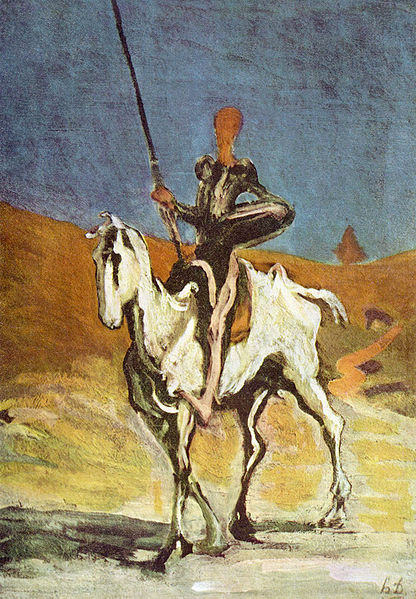The history of Spain is lined with conflicts between the Moor and the Christian. After the Battle of Covadonga, Pelagius of Asturias was the big guy. He established the first state independent of the Moors and reclaimed Iberian Peninsular, hence the beginning of Reconquista of the Christian. Pelagio's name was mentioned here by the poet, of course, to lament the Christian pride while at the same time, shed empathy to the Moors.
 |
| The Surrender of Granada by Francisco Pradilla Ortiz |
Around the year of 682, a general (possibly) under the name of Julian, Count of Ceuta sent her daughter, later became known as La Cava (means scarlet woman) Rumia, to King Roderic's court for education, only to turn into an affair between the daughter and the Visigothic King. Julian betrayed Hispania to the Moor...so of course the Christian later call La Cava a whore and Julian a traitor, while the Muslim deified the girl. Inspired by this story, there's Dana Broccoli's novel Florinda, later became a musical La Cava.
All the poet is saying is: pride shouldn't come from materialized grandiose. Memories can fade and castles can rot, an army of thousands and defense of steel can be annihilated and eventually become some syllables in the bard's song. If lessons from the past cannot be learned, than a leader would be worthless, especially when he's content with superficial flattery of his subordinates.
 |
| Don Quixote by Honoré Daumier 1868 |
Spain should be nothing short of bravery. Chivalry should be her middle name! The man of La Mancha amused the whole world but also showed them how honourable Don Quixote is as a Spanish knight. By 19th Century, King Charles IV had to ally with France during the peninsular war after previous defeats. Spain had been an underdog for so long, and, in those eyes of Harold with the same blunt bravery as Don Quixote, it's about time she wakes up and pick up her lance once again.
You could almost hear the drum rolls with the intensifying rhythms, stanza by stanza. Tis almost time for the big battle, and all you can feel in the air, in the whispers around you are war calls. All the lost souls in the battlefields, they died for the conflicts of nations!
The thing about wars in ancient times: those who shed blood in the heart of the fight, their lives seemed expendable. Doesn't make you flinch and shiver just to think about that? The tyrants, no scratch that, even the kindest rulers wouldn't really care about his peasant soldiers' lives during the war.
This peninsular has had rulers of so many different religious beliefs and ethnic backgrounds. A long tapestry of history shrank into a few words in this stanza. Siroc, for one, is short for Sirocco, a wind from Mediterranean sea that originates from North Africa, the homeland of those Moors that ruled this land for centuries past.




No comments:
Post a Comment